Early Theatre Deep Dive Pt 3: David Tennant in 'Twelve Angry Men' (1991)
...they do a surprise last production in Cumbernauld!
Welcome back, fair readers!
Today is the third and last installment of my three-part series on a young David Tennant’s involvement in Theatre Positive+ Scotland’s production of Twelve Angry Men during his drama school years in 1990 and 1991.
If you haven’t yet read Parts One and Two, I encourage you to do so. You can find them below - go read them both, and then hurry on back!
and
During my years of research into David’s involvement with Twelve Angry Men, I got in touch with many of David’s fellow cast members. I’ve featured their memories in previous posts in this series. But at some point during our conversations, each and every one of them said they’d done a set of dates in Cumbernauld. Not a one, however, could recall precisely when…only that it was some time after the July 1990 dates at the Arches.
I believed them, of course. I knew they weren’t just making it up out of whole cloth! But I also knew in order to nail down precise dates and times, I would have to use other sources. I first contacted the Cumbernauld Theatre in hopes they had records, but they didn’t have anything archived. I also poked around in the newspapers I had access to at the time. When I finally moved to Scotland for two years to get my postgrad in 2018-2020, I took a trip to Cumbernauld to do some further research. Still, without any idea about dates except a vague “sometime after July 1990”? I didn’t get too far.
Fast forward to 2022, and I was browsing in a newly-obtained online newspaper…and there it was! It was immediately clear why I’d had such a difficult time finding it before. It had happened nearly nine months after the Arches run! Since none of the cast members had suggested it might be that long after their July dates, I’d only cast my initial net of searches out about three to six months. No wonder I’d missed it!
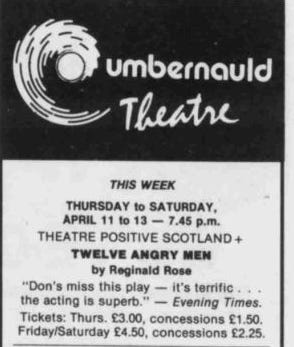
And boy, once I found that first hint, other mentions of it started popping out at me:
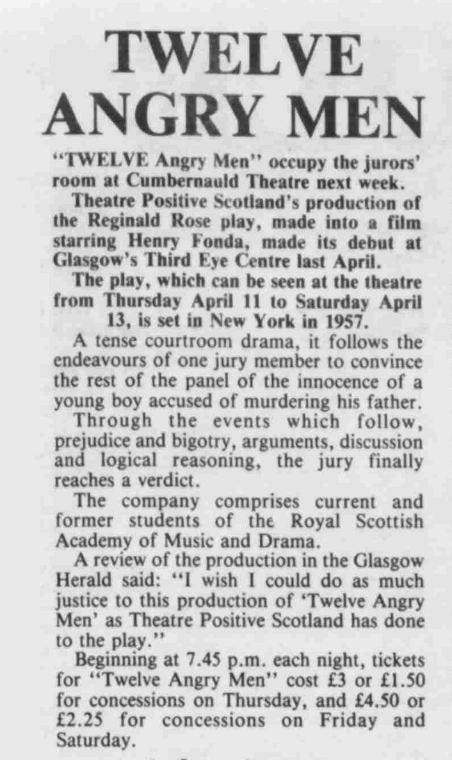
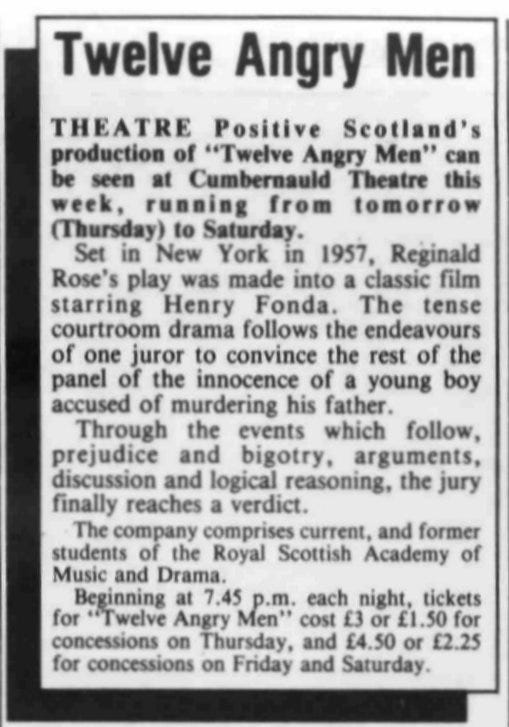
None of these announcements mention David (or, for that matter, any other cast member) by name. Even David’s CV doesn’t mention Cumbernauld (it only mentions the name of the production and the company who produced it). And just because it was Theatre Positive+ Scotland didn’t necessarily mean he was in the cast; companies change their members all the time (especially with a gap of almost a year between runs)! So I thought it very lucky indeed I’d already spoken to cast members who told me about Cumbernauld and that David had been a part of its cast. Otherwise, I would have had no way of confirming whether David was in the run, and might have easily passed by these mentions without any realization of their worth.
-
With around nine months between the July 1990 run of Twelve Angry Men and its last April 1991 run, re-rehearsals were a must. David and his cast mates reunited to begin rehearsals for the show about a month before opening night.
Ashley Collishaw [role: Juror #5] told me their run in Cumbernauld wasn’t planned at all. “It was only after we finished the Arches that it came up as a possibility,” he said. “We kept the same cast, mostly…Stephen Hogan, who played the Guard, had a conflicting schedule and couldn’t make it. And once again, Iain Reekie directed.”
And Sam Ellis [role: Foreman] said he remembered good times. “We had rehearsals both in studios at the RSAMD and in a scout hut on Crow Road [in Glasgow]. I remember each venue, and how they were all very different with regards to adapting the staging. We played the Cumbernauld Theatre for at least two nights - possibly three or four. I remember journeying out there all together in a minibus!”
Speaking of the Cumbernauld Theatre: the theatre David and his fellow cast members entered wasn’t the theatre we know today. Today it’s called the Cumbernauld Theatre at Lanternhouse. It opened in 2021 and sits on the Cumbernauld Academy campus on South Kildrum Ring Road.
The theatre of 1991, though, was located on Braehead Road. Established in 1963 as a community theatre in a row of cottages built in the 1700s, it was originally dubbed the Cumbernauld Cottage Theatre.

The theatre was improved and updated over time. By the time Theatre Positive Scotland was scheduled to perform there in April 1991, its main theatre had a seating capacity of three hundred and its adjoining studio theatre sat eighty.
According to Collishaw, Twelve Angry Men was performed in the main, horseshoe-shaped theatre.
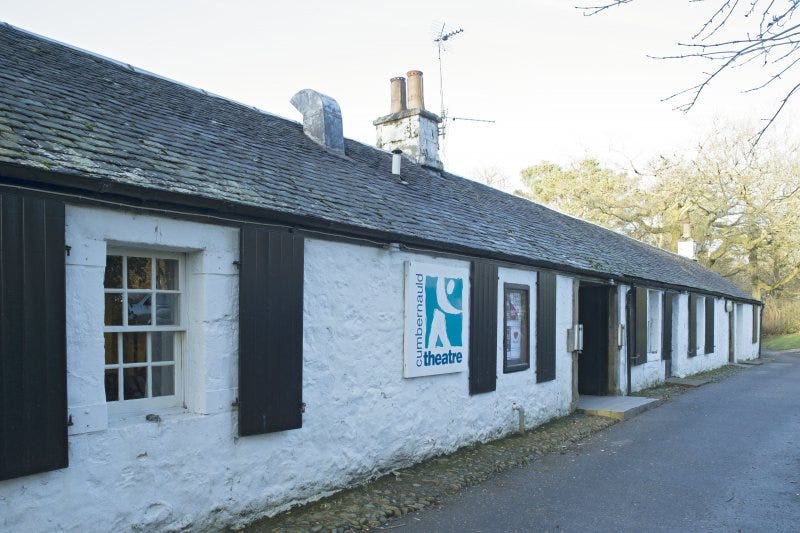
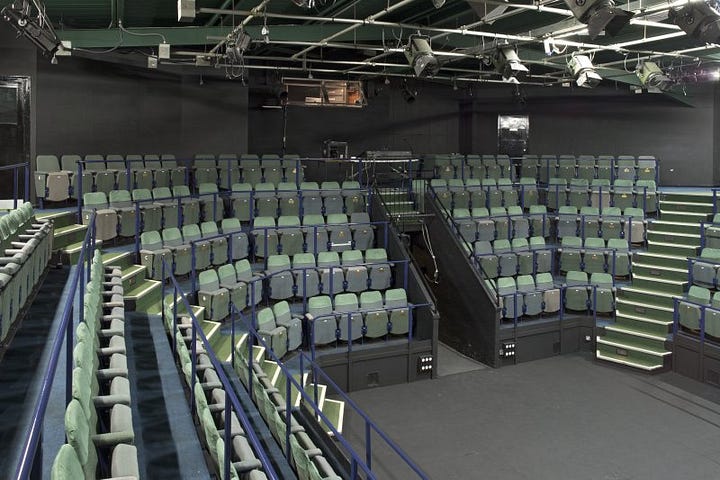
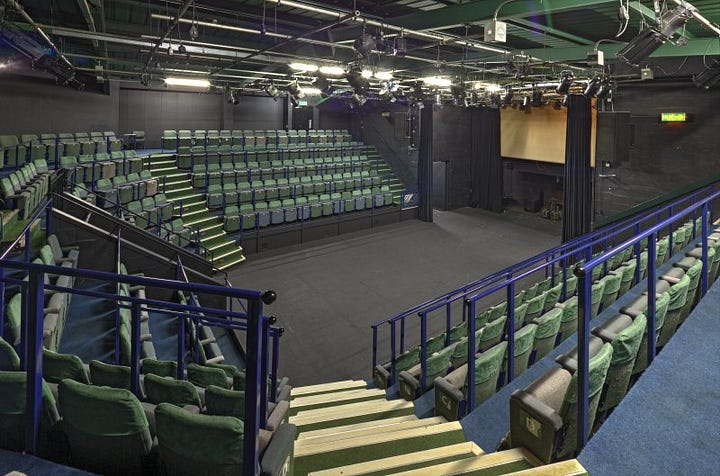
-
Twelve Angry Men opened at the Cumbernauld Theatre on Thursday, 11 April 1991, and ran for three performances. Its final show was on Saturday, 13 April 1991.
Tickets for the Thursday performance ran £3.00 (with a £1.50 concession ticket fee). On Friday and Saturday, performance tickets were £4.50 (with a £2.25 concession ticket fee). The play began at 7:45 pm, and there was a fifteen minute interval.
The cast remained the same, with the exception of Stephen Hogan - who had other commitments and couldn’t reprise his role as the Guard. The decision was made not to re-cast his role.
Those attending performances would have received flyers (as they would have in the other two runs), but Collishaw told me he doubts any of those have survived. They would have also received the following programme:

They would also, of course, heard American accents!
After three nights, the show closed for good. Its cast dispersed, and Twelve Angry Men was no more.
-
Before I go on with the “afterwards” part of Twelve Angry Men, I want to take a bit of an aside here to share an amusing anecdote about the play’s programmes.
I’ve shared two out of the play’s three programmes during this series: the one from the Cumbernauld run (posted above), and the one for their July 1990 dates at The Arches. I mean…I know that now. But initially? Deciphering which programme was which was a bit of a nightmare (especially since I didn’t know half of what I know now about the production)!
You can take a look at this comparison here:
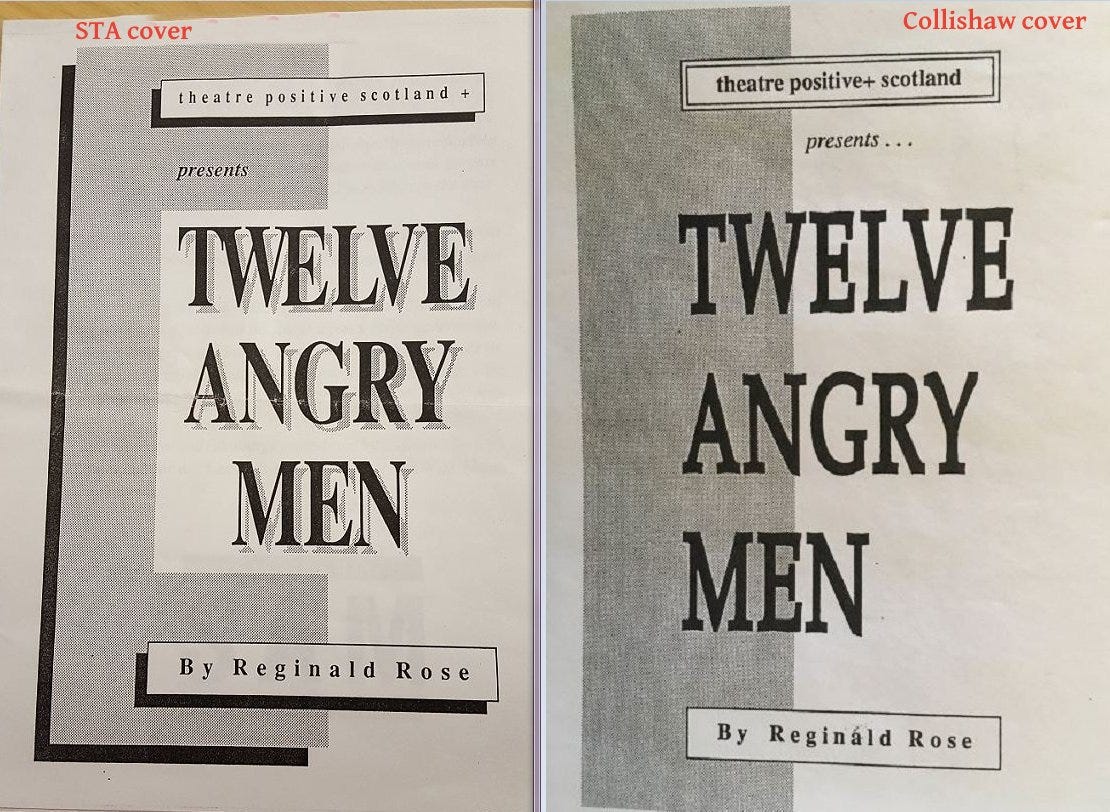
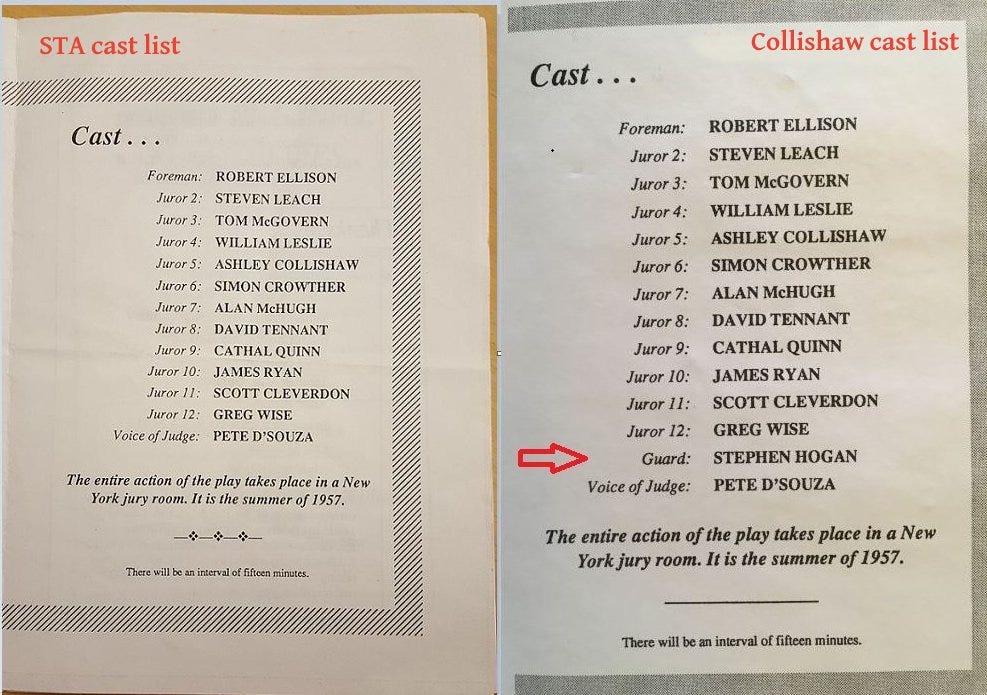
I got one of the programmes in 2017 from Ashley Collishaw, who told me he couldn’t remember which run it was from. I got the other in 2019 when I visited the Scottish Theatre Archive (STA).
Though neither of the programmes mentioned a venue, their front covers were different and one cast list had an extra person listed. I compared the cast number differential with reviews of the shows: one reviewer in the Herald for the April 1990 show at the Third Eye Centre noted there were “thirteen actors, all RSAMD students,” while a July 1990 review of the show at The Arches mentioned twelve actors.
I got excited. Ah HA! I figured it out!
But wait. No, I didn’t.
It wasn’t until I talked to Stephen Hogan and he told me he hadn’t attended the last shows in Cumbernauld when things started taking shape. If he wasn’t in the Cumbernauld shows, that meant the programme which the STA held (and which didn’t have him listed) was the one for that run.
This was further proven when I noticed one of the other pages of the STA programme:
All I had to do to nail the date down was to find out which year (1990 or 1991) would have the 23rd of April fall on a Tuesday. A quick Google of both calendars told me it could only be 1991, and that cinched it: the STA programme (catalogue #GB 247 STA PYC 3/75) was for the run of Twelve Angry Men at the Cumbernauld Theatre!
But hm. That’s not what the STA says: the STA has it dated 2000!
Well, 2000 is just ridiculous. The cast list has David Tennant on it, and by 2000 the man was living in London, not doing a Theatre Positive+ Scotland play!
I emailed the Scottish Theatre Archive in February of last year detailing all the proof I’ve gathered - interviews, newspapers, etc. But ya know, I should probably email a follow-up…because as of now, they haven’t changed the date.
Oh, and the Collishaw cast list and cover? That one’s still a bit questionable. On the one hand, it matches the amount of actors mentioned in the Herald review (thirteen, as Pete D’Souza’s part was tape recorded). But Stephen Hogan told me that while he did both runs, the Arches run programme was the one most likely to have credited him in his tiny role, as the Third Eye run was a dry run and not the “main event”. So, until I can corroborate it in some other fashion, I have settled on the July 1990 Arches run as the Collishaw programme’s most likely origin.
-
I asked Collishaw if the cast and/or crew of Twelve Angry Men had, to his knowledge, ever made any recordings of the show - whether rehearsal recordings or audio/video recordings of a performance. He told me they hadn’t.
I might’ve said some bad words.
-
And now - to the “afterward” part of this lengthy post.
We’ll talk first about the young men who played the jurors in Twelve Angry Men, then find out what happened to Theatre Positive+ Scotland, and finally what happened to its director, Iain Reekie. But first…the actors.
Juror #8, of course, was played by David Tennant. Hmm. I guess he’s done all right for himself, yeah?
I’ve already featured three of the other eleven actors (Ashley Collishaw - Juror #5, Sam Ellis/Robert Ellison - Foreman, and Stephen Hogan - the Guard) in a previous post. I don’t think I mentioned that Hogan went on to work with David a few more times at the Dundee Rep - in Shinda and the Magic Ape in late 1991, and in Princess and the Goblin in late 1993.
But a number of the other actors who worked in Twelve Angry Men also went on to establish careers in the entertainment industry:
Tom McGovern played Juror #3. McGovern graduated from the RSAMD in 1991 with a DDA (Diploma in Dramatic Art). He did a number of other student productions with David before Twelve Angry Men (including Jack and the Beanstalk, The Fruits of Enlightenment, and the radio play Golaschin - which I did my only podcast episode on) before he went on to star as Arturo Ui in the 7:84’s The Resistible Rise of Arturo Ui (again with David)! Afterwards, he’s starred in Holby City and Taggart and spent years on the UK stage at the Royal Lyceum, the Citizens' Theatre, and the National Theatre of Scotland, among others. He also won a 2020 Critics Award for Theatre in Scotland for his performance in The Signalman at Oran Mor's "A Play, A Pie & A Pint" in Glasgow.
David’s good mate Alan McHugh played Juror #7. McHugh is not only a well-known actor (he was on Taggart, Take the High Road, and Rab C. Nesbitt, among others), he’s worked with pretty much every theatre company in Scotland. He’s also widely acknowledged as the UK’s foremost panto performer.
In a recent podcast episode of Putting It Together w/Brian O'Sullivan, McHugh mentioned he got an agent immediately after doing Twelve Angry Men…and so did David. McHugh said, “I got an agent before I left [drama school] because I was in a show...Twelve Angry Men at the Third Eye Centre, one of the best shows I've ever been in, and [agent] Pat Lovett came to see the show and offered me to take me and David Tennant on...because David was in my class in college. Interestingly, we went to meet Pat Lovett on the same day. I signed with Pat, and David went elsewhere...”
McHugh is also a prolific writer. One of his first works, The Street, was a full-scale musical about a single mother forced into prostitution, which he wrote and staged himself. It did three runs in March, April and August of 1990 at the Scottish Student Drama Festival, the Best of the SSDF in St. Andrew, and at the Edinburgh Fringe. One of its cast members, who played the part of the Young Cop? David Tennant! (I’ll talk more about The Street some other time, I promise. It’s pretty interesting.)
Juror #9 is Cathal Quinn. A native of Ireland, Quinn worked with David in the RSAMD musical The Good Companions before graduating with a Diploma of Dramatic Art (DDA) in 1990. He began his career as an actor, but after completing his Masters in Voice Studies from Central School of Speech and Drama, he went into voice coaching and worked on movies like Albert Nobbs, Strength and Honor, and Milo. Quinn taught at the Oxford School of Drama and was Head of Voice at the Gaiety School of Acting before taking his current position as the Head of Voice and Speech at The Lir Academy, Trinity College Dublin.
Juror #11 was played by Scott Cleverdon, a native of Edinburgh. He graduated from the RSAMD in 1991 with a DDA (Diploma in Dramatic Arts). Cleverdon was the original voice of Cletus Cassidy, aka Carnage, in the 1996 Spiderman Animated TV series, the voice of Obi-Wan Kenobi in the 1999 video games Star Wars: Episode 1 - The Phantom Menace and Jedi Power Battles, and the voice of Jack Walker in Batman Beyond that same year. He also portrayed Gonzalo Fernandez de Cordoba in the TV series Borgia in 2011 to 2014, and was the angel Pyriel in the film The Prophecy 3: The Ascent, in 2000. That year he and his wife, Spanish actress Assumpta Serna, founded the School of Film Acting. Since then, they’ve taught more than 13K hours of film acting.
Then there’s the fellow who played Juror #12. He’s a Newcastle-Upon-Tyne-born actor named Greg Wise who also graduated from the RSAMD in 1991 with a DDA (Diploma in Dramatic Arts). Other than being Mr. Emma Thompson, he’s got quite the resume himself. Wise starred alongside his future wife in the 1995 movie Sense and Sensibility as John Willoughby, which also starred Kate Winslet and Hugh Grant. He's worked continuously since then in period pieces like Madame Bovary and Cranford, and in television dramas such as Law and Order: UK and The Crown. He was recently a contestant on Strictly Come Dancing.
Of the others, I’d be remiss if I didn’t mention Inverness native Simon Crowther, who played Juror #6. Crowther died in 1993 when he accidentally drowned during a late-night swimming party off Australia’s world-famous Bondi Beach. After Twelve Angry Men, Crowther had appeared in the BBC's The Bogie Man and in the Cumbernauld Theatre's production of Hansel and Gretel before deciding to travel the world for a year.
The RSAMD set up an Award in his memory.
-
And what happened to Theatre Positive+ Scotland? Well, the month before the Cumbernauld run of Twelve Angry Men, the company had produced a triple bill of playlets by Iain Heggie (who was later to write An Experienced Woman Gives Advice, the 1995 play David appeared in) called ‘Waiting For Shuggie's Ma’, ‘Education Of A Gentle Pervert’ and ‘Warren Beatty In The Garden’, which, combined, were called A Night Of Gentle Sex Comedies.
A Night Of Gentle Sex Comedies was directed by Iain Reekie and did its initial run at the Traverse Theatre in Edinburgh in late March. It then made its four-night debut at the Third Eye Centre in Glasgow the week after Twelve Angry Men wrapped in Cumbernauld.
I haven’t found any evidence Theatre Positive Scotland continued in any fashion as a company.
-
And what about Twelve Angry Men’s director, Iain Reekie?
Less than a week after wrapping Twelve Angry Men, Reekie was announced as one of four winners of the 1991 Regional Theatre Young Director Scheme. He was awarded a one-year attachment to the Nottingham Playhouse as a Trainee Associate Director. But during the time he was directing Twelve Angry Men in April 1991, Reekie and his brother Tony - the research coordinator for a theatre company called 7:84 - had also become deeply involved with creating a new play for the 7:84 about the Scottish steel industry and its effects.
Reekie left for Nottingham, but his investment in the play (which eventually became Jump The Life To Come) was of such intensity that he chose to leave his position in Nottingham after six months and return to Glasgow to further its development. And just as Jump The Life To Come made its premiere in February 1992 with Reekie in the director’s chair, he was appointed the Artistic Director of 7:84. He stepped into the position officially in April 1992, and went on to lead the company until mid-2000.
You might be wondering why I’ve spent this much time talking about Twelve Angry Men’s director. It’s because I’m building a case that some of the details concerning Reekie’s career are important to David’s career, too.
About a month or so after David graduated from the RSAMD in late June of 1991, he auditioned and won a part in the 7:84 play The Resistible Rise of Arturo Ui. He went on to do three more productions with the company. Of those four productions (the aforesaid Arturo Ui in 1991, 1992’s Jump The Life To Come and Scotland Matters, and Antigone in 1993) the last three were directed by Iain Reekie.
It’s also important to remind everyone of something else I mentioned in my last installment of Twelve Angry Men: that the 7:84’s then-Artistic Director David Hayman had attended a performance of Twelve Angry Men.
You see, there has been some back-and-forthing for years about how (or even if!) David got noticed by the 7:84. Some have claimed it was during his run as Benjy O’Neil in 1989's The Ghost of Benjy O'Neil (as Wildcat founder and ex-7:84 member Dave Anderson had attended a show during that production). Even The Ghost of Benjy O’Neil’s author, Tommy Crocket, had presented me with that theory.
But my working theory runs contrary to that. Dave Anderson did indeed attend a performance of The Ghost Of Benjy O’Neil, yes…but he wasn’t involved with the 7:84 at all when he did. He’d left ten years before to found Wildcat Theatre and was very involved with that company at the time he saw David as Benjy. So one would think if Anderson had wanted to pluck David as a talent, he would’ve drawn him toward Wildcat, not the 7:84! But David never worked with Wildcat.
I suspect that, tangentially, it may actually be Twelve Angry Men, instead.
When I learned David Hayman (who was then the 7:84’s Artistic Director) was at a performance of Twelve Angry Men, I began to think more about a possible timetable of events. It was only about four months after Twelve Angry Men’s last performance in Cumbernauld that David and his fellow castmate Tom McGovern were hired by the 7:84 to do The Resistible Rise of Arturo Ui.
And while they were hired in September 1992 under Hayman’s directorship of the company, Iain Reekie would take over some five months later. Working with Reekie on Twelve Angry Men probably did David a world of good. Under Reekie’s leadership, David worked on a total of four productions with the company before filming Takin’ Over The Asylum and making the decision to move to London.
And of course, one shouldn’t forget that the first few runs of Twelve Angry Men also helped David to secure an agent even before he left drama school! So the play was powerful, it was critically celebrated…and it got him noticed.
So, to me? We can all partially thank Twelve Angry Men for helping David snag some early jobs.
-
That’s it for Twelve Angry Men!
I hope you’ve enjoyed my deep dive into the play - and as always, if you have questions or observations, feel free to drop them in the comments section.








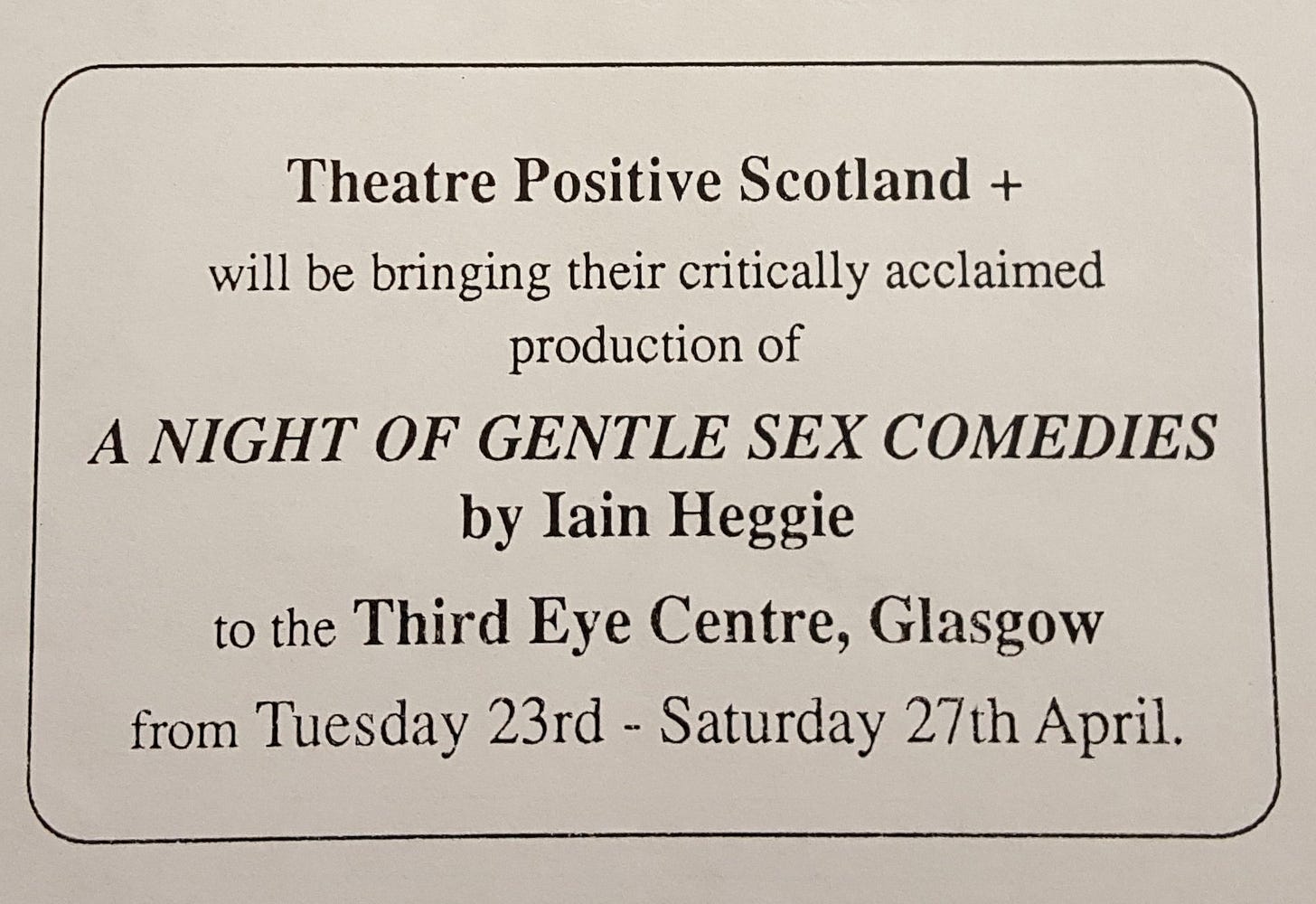
Excellent research into David’s early career. It’s great to read about his early theater & colleagues; along with the doors these early relationships opened.
Bravo!
Thanks for sharing Patricia, I love your blog!